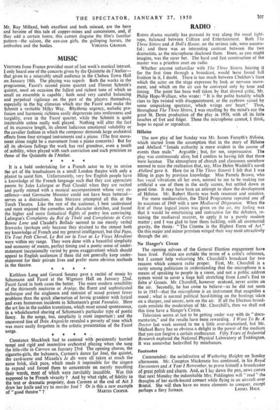MUSIC
VISITORS from France provided most of last week's musical interest. I only heard one of the concerts given by the Quintette de l'Atelier- that given to a miserably small audience in the Chelsea Town Hall on January 18th. The playing was superb. Both the works in the programme, Faure% second piano quartet and Florent Schmitt's quintet, need on occasion the fullest and richest tone of which so small an ensemble is capable; both need very careful balancing and perpetual vigilance on the part of the players themselves, especially in the big climaxes which star the Faure and make the Schmitt a veritable Milky Way. Rhythmic urgency, melodic pro- fusion and harmonic richness easily degenerate into restlessness and turgidity, even in the Faure quartet, while the Schmitt is quite intolerable unless really well played. Nothing will alter the fact of its excessive length, its almost ludicrous emotional volubility or the cavalier fashion in which the composer, demands large orchestral effects from four stringed instruments and a piano. (The first move- ment alone might be a movement from a piano concerto.) But for all its obvious failings the work has real grandeur, even a touch of nobility, when played with such conviction and such precision as those of the Quintette de l'Atelier.
* * * * It is a bold undertaking for a French actor to try to revive the art of the troubadours in a small London theatre with only a pianist to assist him. Unfortunately, very few English people have a knowledge of the French language such that they can appreciate poems by Jules Laforgue or Paul Claudel when they are recited and partly mimed with a musical accompaniment whose very ex- cellence—and Germaine Mounier could not have been bettered— serves as a distraction. Jean Mercure attempted all this at the Torch Theatre. Like the rest of the audience, I best understood and most enjoyed the comedies and character sketches, and found the higher and more fantastical flights of poetry less convincing. Laforgue's Complaitite du Roi de Thule and Complainte de Cette Bonne Lune and Claudel's Ballade seemed to me merely verbal fireworks (perhaps only because they strained to the utmost both my knowledge of French and my general intelligence), but Oui Papa, Un Tout Petit Cheval, Le Roi sur la Tour or Le Vieux Mendiant were within my range. They were done with a beautiful simplicity and economy of means, perfect timing and a poetic sense of under- statement (occasionally varied by gross exaggeration) which should appeal to English audiences if these did not generally keep under- statement for their private lives and prefer more obvious methods in the theatre.
* * * * Kathleen Long and Gerard Souzay gave a recital Of music by Schumann and Faure at the Wigmore Hall on January 22nd. Faure fared in both cases the better. The more modern sensibility of the thirteenth nocturne or Arpege, the fluent and sophisticated technique and the singleness and restraint of mood present fewer problems than the quick alternation of heroic grandeur with lyrical and even humorous incidents in Schumann's great Fantaisie. Here the art lies in the sudden transitions, which must sound spontaneous, in a wholehearted sharing of Schumann's particular type of poetic fancy. In the songs, too, simplicity is most important ; and the uncovered line of Dein Angesicht revealed a poverty of tone which was more easily forgotten in the artistic presentation of the Faure songs. * * * * ,
Constance Shacklock had to contend with persistently hurried tempi and rigid and insensitive orchestral .playing when she sang the title-role in Carmen on January 23rd The opening "chorus, the cigarette-girls, the habanera, Carmen's dance fpr Jose, the quintet, the card-scene and Micaela's .le dis were all taken at much the same brisk, slick pace, which made it impossible for the singers to expand and forced them to concentrate on merely mouthing their words, most of which were inevitably inaudible. Was this supposed to be French vivacity ? And by what right, of fidelity to the text or dramatic propriety, does Carmen at the end of Act 3 draw her knife and try to murder Jose? Or is this a new example










































 Previous page
Previous page